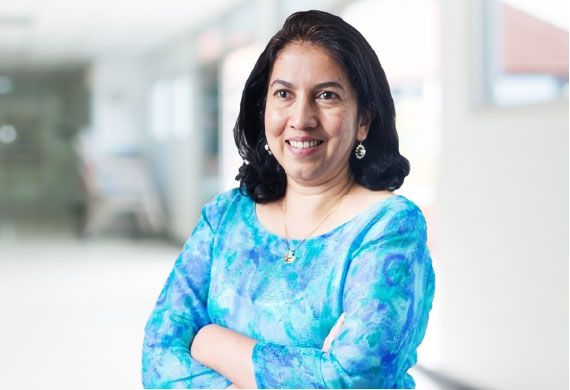Leaders

Dr. Manjiri Bakre: Revolutionizing Cancer Diagnosis Through Translational Research And Diagnostic Validation
Dr. Manjiri Bakre
Founder & CEO, Oncostem Diagnostics
Bangalore
Researchers in oncology are pivotal to the relentless pursuit of better cancer treatment and patient care. Their work is the backbone of progress in the fight against cancer, delving into the complexities of the disease at every level—from its molecular and genetic foundations to its intricate behaviour within the human body. Through painstaking research and innovation, these experts contribute to the development of groundbreaking therapies, the refinement of diagnostic techniques, and the exploration of preventive strategies that may one day render cancer a more manageable or even preventable condition.
Dr. Manjiri Bakre, Founder and CEO of Oncostem Diagnostics, stands out as a key figure in this field. Through her development of innovative prognostic algorithms, Dr. Bakre has brought significant relief to cancer patients by enabling more personalized and effective treatment plans. Oncostem Diagnostics, under her leadership, focuses on understanding tumour biology to create diagnostic tests that allow physicians to tailor therapies to the unique characteristics of each patient’s cancer. This personalized approach not only enhances treatment efficacy but also improves the quality of life for patients, exemplifying the transformative potential of research and innovation in oncology.
In a candid interview with us, she shared how her journey has been life-saving for many, along with the challenges and milestones she has faced.
Can you share your journey in the diagnostics sector? What have been the most pivotal moments in your career?
My journey in diagnostics has been both fascinating and rewarding. Initially, I developed assays for point-of-care diagnostics but felt unfulfilled as they weren't fully utilized. This led me to start my venture, driven by the belief in doing something scientifically significant. Focusing on cancer diagnostics, I found immense fulfillment in creating a test used by over 6,000 patients in India in the last few years and helping ~70 percent of them to avoid chemotherapy. The most rewarding aspect has been the gratitude from patients and doctors who appreciate this affordable, India-developed test. Securing venture capital as a first-time entrepreneur and collaborating with hospitals were crucial to my success. Ultimately, the feedback from patients is my greatest reward.
What led you to establish Oncostem Diagnostics? Tell us about the underlying idea behind the venture and its key areas of expertise.
When people hear the word ‘cancer,’ their immediate thought is often of something deadly and almost inevitable, with chemotherapy being synonymous with the disease. However, this isn't always the case. Not all cancers require chemotherapy, especially in the context of early-stage breast cancer / with small tumours. Currently, about 95 percent of patients with small tumours (1-3 centimetres) undergo chemotherapy, even when it might not be necessary. The primary tumour is removed through surgery, but whether a patient needs chemotherapy afterward depends on the aggressiveness of the tumour.
At OncoStem, we developed a test called CanAssist Breast, which assesses how aggressive a removed tumour is and predicts the likelihood of cancer recurrence within five years using an AI-based algorithm. By analyzing biomarkers that indicate aggressiveness, we can determine the probability of the cancer returning in areas like the liver, bones, brain, or other organs. Our test has shown that about 70% of patients have a low risk of recurrence, allowing them to avoid chemotherapy while still undergoing surgery, radiation, and targeted anti-hormonal therapy. It's important to distinguish between diagnostic and prognostic tests. Diagnostic tests determine whether a patient has a disease, while prognostic tests, like ours, predict how the disease will progress after diagnosis.
Future cancer treatment hinges on advancing diagnostics. Particularly through identifying biomarkers essential for effective therapies
OncoStem focuses on developing prognostic tests, starting with breast cancer, and our test has already benefited over 6,000 patients in the past eight years. We're also working on expanding our suite of tests. The inspiration behind OncoStem came from a personal experience during my PhD. A close friend was diagnosed with early-stage breast cancer but, despite early detection and treatment, she eventually succumbed to the disease. This tragedy made me question whether we could assess the aggressiveness of small, early-detected tumours to guide treatment decisions better.
This experience laid the foundation for OncoStem Diagnostics, which I founded in 2011. To clarify, chemotherapy's role is to kill any remaining cancer cells in the body. Our test doesn't diagnose cancer but helps determine whether chemotherapy is necessary by evaluating the tumour's aggressiveness. If the tumour is small, localized, and not aggressive, chemotherapy may be unnecessary, sparing the patient from costs associated and its potential side effects.
As the founder what are the key roles and responsibilities you shoulder at Oncostem Diagnostics? What are your major focus areas for driving growth for the diagnostics centre?
As the founder, I have overseen in the past all aspects of our company’s success, from the most essential tasks like fundraising, scientific aspects, and hosting official guests to managing daily operations. Over the years the operations are led by COO. Fundraising is my key responsibility, which is essential to hire people and provide resources for the team. And I have successfully raised two rounds of venture capital, totaling double-digit millions in US dollars. I also manage key aspects like hiring the right talent, overseeing the company’s finances, creating awareness about our products, and protecting intellectual property through patents.
We are currently developing a second test, hence also focusing on scientific research, identifying biomarkers, and execution planning. I have also led the successful launch of our first prognostic test, CanAssist Breast (CAB), available in India and international markets like Sri Lanka, Turkey, and the UAE. My focus now is also on further expanding CAB sales across Asia, the Middle East, and into Western markets. And ensuring more patients can benefit from our innovative diagnostic solutions.
"I stress maintaining high standards and respect for others to earn respect and achieve success"
Can you highlight the most significant milestones in your professional journey? What has been your success mantra over the years?
My success mantra is straightforward: pay close attention to detail, and work with genuine interest because you want to, not because someone else asks you to. In a startup, you are your boss and the face of the company, both to your employees and to the outside world, so motivation must come from within. Being intrinsically motivated is essential, along with being empathetic and committed to hard work—there’s no substitute for it. You can be brilliant, but without hard work, you won’t get far.
The most significant milestones in my journey include securing funding, establishing hospital partnerships in India and internationally, getting international scientific publications, obtaining patents, and developing a clinical test for cancer patients that is not only used but also appreciated by doctors and patients alike. It's rare to have an idea and execute it to create something that’s used globally and receives positive feedback from both patients and doctors, which continues to drive me forward.
How do you envision the future of oncology diagnostics? What emerging industry trends do you believe will shape the field?
Oncology diagnostics have traditionally been invasive, often requiring early surgery. As our understanding of cancer deepens, I foresee a shift towards prevention, predicting risk before the disease develops to prevent metastasis. Future cancer treatment hinges on advancing diagnostics, particularly through identifying biomarkers essential for effective therapies. I anticipate less invasive techniques, like imaging and blood tests, leading to better cure rates and improved patient quality of life. By detecting cancers early through advanced imaging, we can reduce aggressive treatments and enhance outcomes, focusing on prevention and minimally invasive methods.
Dr. Manjiri Bakre, Founder & CEO, Oncostem Diagnostics
Manjiri Bakre is a seasoned cell biologist with extensive expertise in AI/ML, microfluidic assays, microarrays, and proteomics. With over two decades in R&D, she has worked in both basic and applied research across India, the US, and Singapore, in both academic and corporate settings.


